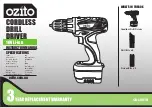
11
• Hold the machine firmly in both hands and in a stable
position.
• Ensure that the part to be worked on is firmly secured
before beginning any operation.
• When sawing metal, apply oil to the cutting point.
• Always use the correct saw blade for each type of
material.
• Only use sharp saw blades which are in perfect con
-
dition. Cracked, bent or jagged saw blades should be
immediately replaced.
• Do not force the saw feed which is adapted to the type
and thickness of the material being worked.
• When sawing, follow the direction of the saw teeth:
force being applied by lateral shifts, will only lead to
breaking the blade.
• Beware of shavings that fly off. Hold the tool that
so that sparks fly away from you or other people and
inflammable materials.
• Do not exert excessive pressure on the base since
this serves as a support and doing so will merely brake
the saw feed.
• If thin sheets are to be cut, we recommend supporting
them on a wooden base to avoid vibration of the sheet
and accidents.
• Ensure that the base plate is totally supported by the
work surface before beginning work.
• The cutting path must be free from any obstacles,
both above and below.
• In no case turn the machine on with the saw blade in
contact with the material, since this places undue strain
on the blade. Insert the saw blade when the machine
has reached the selected speed.
• A protective face mask must be employed in any work
producing harmful dust. Material containing asbestos
must not be worked.
• When working with the machine, always wear safety
goggles and ear protection. Other personal protection
equipment such as dust masks, gloves, helmet and apron
should be worn when necessary, along with non-slip
safety footwear. If in doubt, use safety equipment.
• Never place hands or fingers in front of the saw when
working.
• Make sure the vents are free when working with dust.
If they require cleaning, first unplug the machine, do
not use metal objects and avoid damaging internal parts.
• When the work is finished, the equipment should be
switched off and the saw blade must be allowed to come
to a complete stop before removing it from the cutting
slot and depositing it (danger of kick-back).
• Always be sure that the tool is switched off and the
battery cartridge is removed before adjusting or checking
function on the tool.
• Always stop the machine by switching it off, not by
removing the battery cartridge.
Before working check the battery level
and charge the battery cartridge when
you notice less tool power. If the battery
cartridge is damaged, exchange it for
another one.
• Always switch off the tool before installing or removing
of the battery cartridge (2 or 4 A
h
).
1.3 SAFETY INSTRUCTIONS FOR USE AND MAIN-
TENANCE OF THE BATTERY AND CHARGER
Do not store the tool and battery cartridge
in locations where the temperature may
reach or exceed 45° C.
Do not incinerate the battery cartridge.
Do not expose battery cartridge to water
or rain.
• Only recharge with the manufacturer's specified
charger. Only recharge with the manufacturer's specified
charger. A charger which is suitable for one type of
battery cartridge can cause a fire risk on another type
of battery cartridge.
• Only use this power tool with the battery cartridge
specifically designed for this model. The use of other
types of battery cartridges may cause injury to the
operator and a fire risk.
• When the battery cartridge is not in use, keep it away
from metal objects, such as paper clips, coins, keys, nails,
screws or other small metal objects that can establish
contact from one terminal to the other. Shorting the
battery terminals may cause burns or a fire.
• Battery fluid may be spilled under extreme conditions;
avoid contact with this liquid. In case of accidental
contact, rinse thoroughly with water. If the liquid comes
into contact with your eyes, seek medical attention.
Battery fluid may cause irritation or burns.
• Do not use damaged or modified batteries. Damaged
or modified batteries can behave in an unpredictable
way and may cause injury to the operator and a fire risk.
• Avoid switching the device on accidentally. Make sure
the on/off switch is in the off position before inserting
the battery. Carrying the power tool with your finger
on the on/off switch or inserting the battery with the
switch in the on position can cause accidents.
• Do not open the batteries. You could damage the
circuits.












































